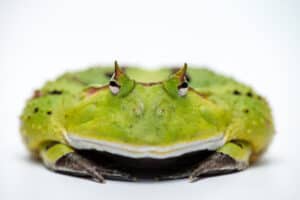How to Get Rid of Frogs
@media (min-width: 481px) {
.mobile-top-content {
display: none;
}
}
#mobileTopContentCTACarouselControls { overflow: hidden; text-overflow: ellipsis; white-space: nowrap; }
.mobile-top-content .more { color: #fff; }
.mobile-top-content a { color: #fff; text-decoration: underline; }
.mobile-top-content a:hover { color: #fff; text-decoration: underline; }
@media (max-width: 480px) {
.mobile-top-content {
background-color: #06a10b;
color: #fff;
text-align: center;
/*height: 60px;
padding-top:5px;*/
font-size:80%;
/* display: block; */
margin: 0px -30px;
}
}
Having a bunch of frogs take up residence in your yard, garden, or even your home can be incredibly frustrating, even for people who love these little amphibians! How can you get rid of frogs in a safe, humane, and responsible way? Don’t worry; you don’t have to simply accept your home’s new fate as a frog hotel.
In fact, there are quite a few options to get them to move along to a new home rather than hanging around your space, from relocating the frogs to using homemade repellents to making your yard inhospitable for them by cutting off their food supply, improving drainage conditions, and more. Let’s take a look at the most effective and humane methods of getting rid of frogs for good.
Why Get Rid of Frogs in Your Yard, Garden, Etc.?
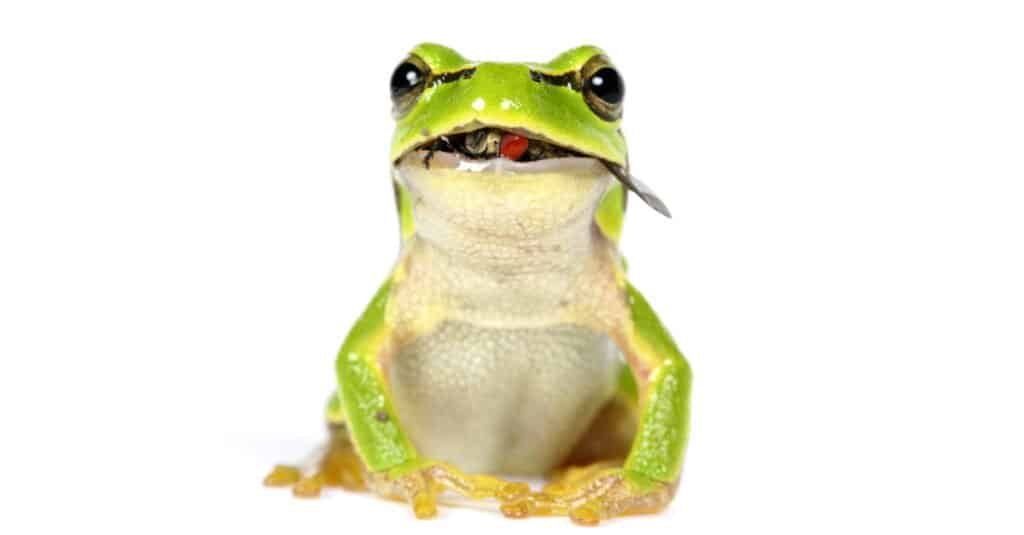
iStock.com/Antagain
You might first be asking yourself, “Do I have to get rid of the frogs?” And the answer to this mostly depends on how many of them have taken up residence in your space and how destructive they’ve been. And remember, frogs can certainly be destructive to lawns, buildings, and other structures in large groups!
For example, if a group of frogs has decided to use your home as a breeding ground, you could go from a few of the hopping herps to an entire colony of them destroying your lawn in just a few days or weeks. If you have pets or children, frogs can be toxic to them to eat or even touch, depending on the species. Many frogs’ burrows can also be very damaging to carefully maintained lawns and gardens. If you have a pool or a pond, they may use it to breed and hatch their eggs, which can present another whole host of issues.
In short, frogs can either be pleasant neighbors or absolute pains to share a space with. In most cases, it’s the latter, so it’s best to be proactive about keeping them away from your home and lawn.
Determine Why Frogs Are Attracted to Your Home or Yard
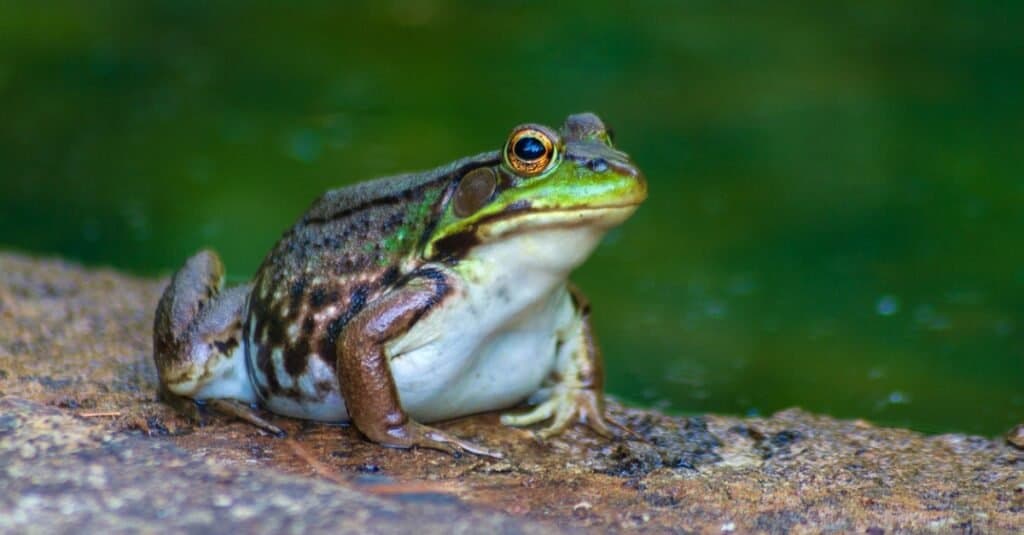
iStock.com/Corey T. Burns
The methods you’ll use to get rid of the frogs in your home, garden, or yard in general will mostly depend on why the frogs are so attracted to the space in the first place. The main conditions most frogs prefer are warm, wet, and densely forested. Additionally, they primarily feed on small insects and invertebrates like crickets, slugs, and beetles. In the case of most frog infestations, the frogs are seeking either shelter, food, or a possible breeding ground.
If your yard has lots of clutter and overgrowth, the frogs are likely hanging out because it provides them with shelter. Alternatively, if you have a pond or a pool that you haven’t been maintaining very well, the frogs could be using it to breed in and house their eggs. If you’ve had issues with pests like insects in the past, the frogs are likely using your yard or home as their personal buffet. In many cases, the reason why these amphibians are sticking around will be a combination of one or more of these things.
Checking around your home and yard and “taking inventory” of how severe the situation is will also help you determine what methods you’ll use to get rid of the frogs and keep them away. If you’ve only got a few frogs or toads hanging around, you may be able to just relocate them. If they’ve already established a significant population, though, you’ll need to be more proactive.
Next, let’s assess some of the ways to get rid of frogs and keep them out permanently. Thankfully, most methods are humane and simply involve making your space less welcoming to them.
Getting Rid of Frogs: Relocating Frogs
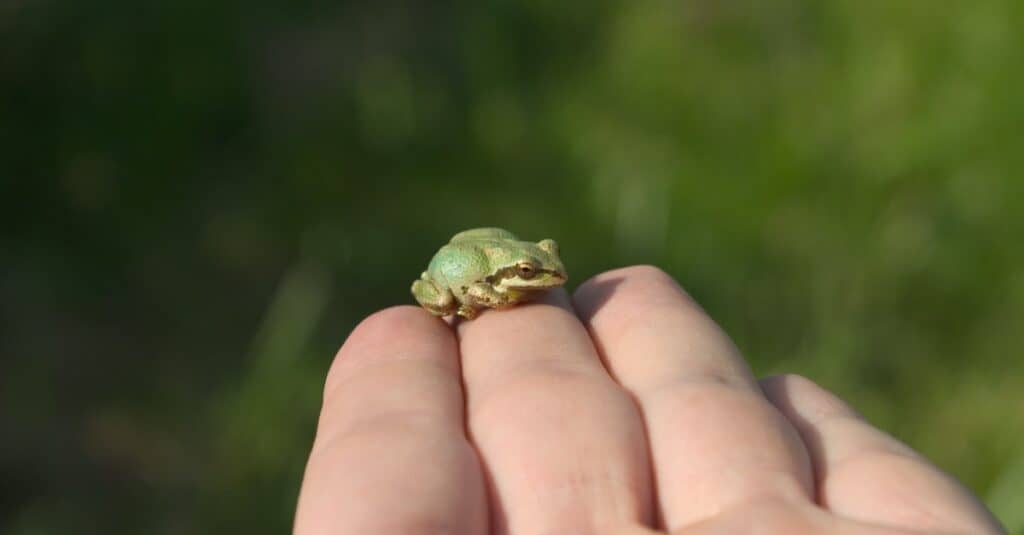
iStock.com/justinhawthorne
If you’ve looked around and have only noticed a few frogs here and there, you’ll likely be able to just relocate the offending freeloaders to a nearby park or other forested area and move on. If you are able, capture the frogs safely and place them in a lightly moistened tank or container. Alternatively, you may be able to call your local animal control or wildlife authorities and have them assess the situation.
In most cases, you’ll need to relocate the frogs to an area nearby so as not to disorient them but far enough away so they don’t end up back at your house. Local parks with plenty of water, insects, and dense plant growth are usually ideal. Be sure to place the frogs in an area where they’ll be able to access a body of water.
Keep in mind, though, that if you have one or two frogs hanging around, there’s a good chance there’s more of them. Additionally, they could have laid eggs around your property. Check any puddles, pools, or other areas where lots of water tends to collect for small, slimy frog eggs. Remove them and dispose of them to prevent more frogs from spawning.
Getting Rid of Frogs: Repellents
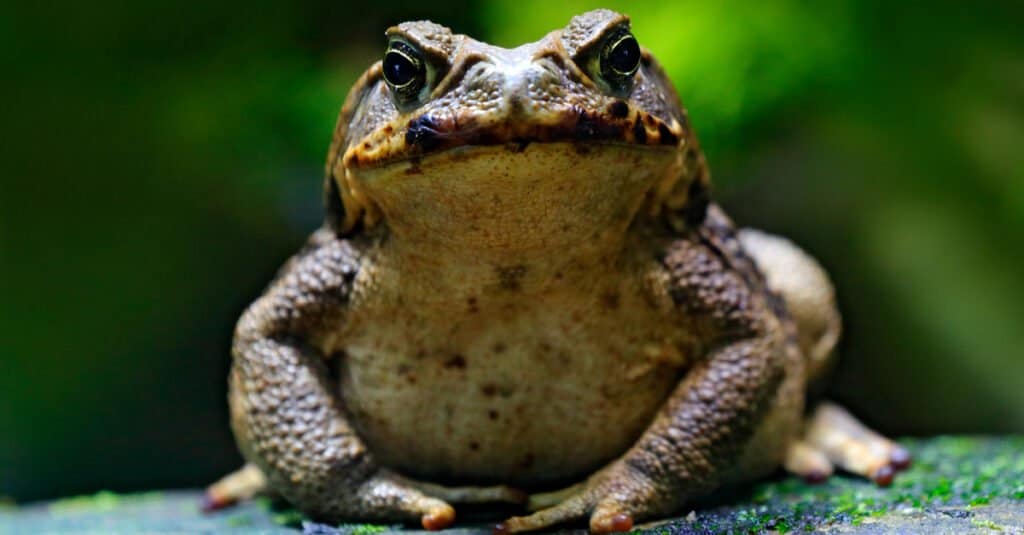
Ondrej Prosicky/Shutterstock.com
After you’ve evaluated how severe your frog problem is and relocated any individuals you’ve managed to gather up, consider using repellents to keep them from returning. There are many inexpensive solutions and even household products that frogs don’t like the smell or taste of. Some of the most effective repellents include:
- Vinegar
- Lemon juice
- Coffee grounds
- Baking soda
- Commercial spray products*
*Note: Some commercial spray repellents contain ingredients that are harmful or deadly to frogs and potentially harmful to your lawn and other animals like pets. Be sure to check the labels carefully on any of these products before using them.
Additionally, never apply any of these repellents directly to a frog’s skin or eyes. Most frogs use their skin to breathe! These repellents can suffocate them if they come in direct contact with the solution.
Apply repellents around the perimeter of your yard and around any other problem areas like your garden, around ponds and pools, and very cluttered, shaded areas. Be sure to reapply them after heavy rains, as many of them will dissolve and lose their effectiveness over time.
Getting Rid of Frogs: Lawn and Home Maintenance
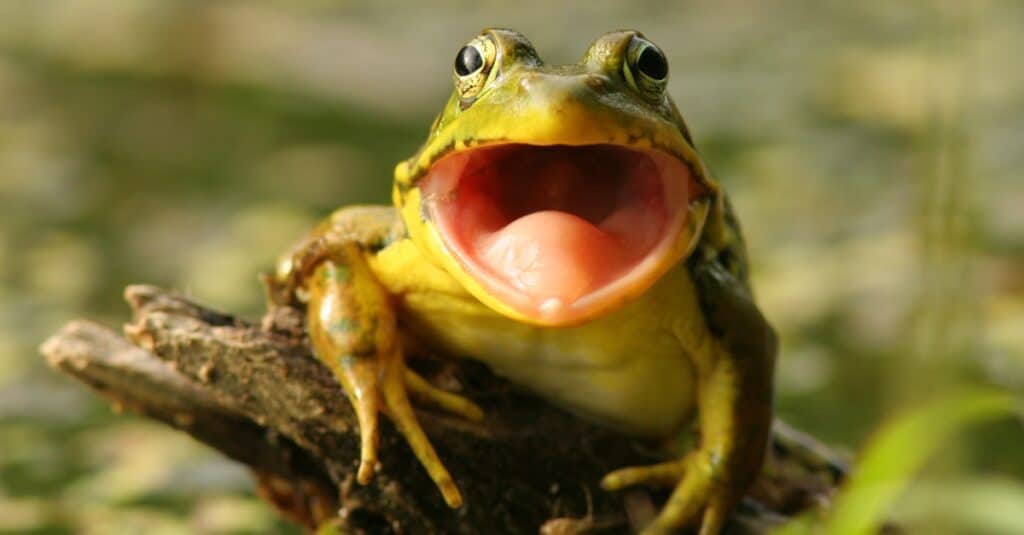
iStock.com/BrianLasenby
As we briefly touched on earlier, frogs prefer areas that are warm, moist, and cluttered with plant growth and other structures. Clutter, in particular, provides frogs with lots of hiding spots. Keeping your home clean and your lawn well-manicured will deter frogs from taking up residence in your space.
In particular, some measures you should take to keep frogs off your lawn and away from your property in general include:
- Keeping your lawn mowed short
- Improving drainage by installing drainage pipes/creek beds and aerating your lawn often
- Trimming any shrubs, trees, and other plants frequently
- Cutting down on lawn decorations
- Keep plant growth around structures like sheds and pools to a minimum
Overall, simply de-cluttering your property will go a long way in keeping frogs and toads at bay. Without enough hiding spots or moisture, they’ll find somewhere else to hang out.
If All Else Fails, Call an Exterminator
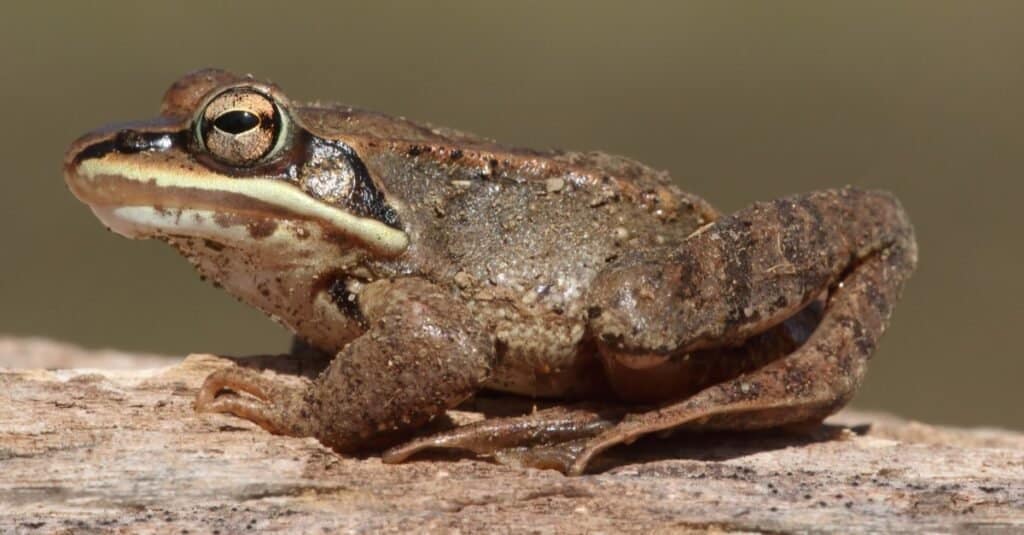
Steve Byland/Shutterstock.com
If the frog population on your property is too much to deal with on your own, you may need to call a pest control company to assess the situation. Also, if you have an invasive species dwelling in your yard, they might need to be relocated or even humanely killed. Consult with professionals to help them determine the best method of clearing the frogs out of your space.
Keep in mind that pest control companies often use chemical treatments for animals like frogs and toads. Be sure to mention if you have any pets or children in case you need to quarantine the area to keep them from potentially getting poisoned. If there are any other animals in your yard you’re worried about, make sure you bring them up, too.
Unfortunately, this may be the only option available to you if your frog situation is out of control. Thankfully, many pest control companies are quite affordable and effective at relocating and/or eliminating destructive frogs in the most humane and efficient way possible.
More from A-Z Animals
.more-snake-card-image { max-height:140px !important; }
@media (min-width: 481px) {
.mobile-top-content {
display: none;
}
}
#mobileTopContentCTACarouselControls { overflow: hidden; text-overflow: ellipsis; white-space: nowrap; }
.mobile-top-content .more { color: #fff; }
.mobile-top-content a { color: #fff; text-decoration: underline; }
.mobile-top-content a:hover { color: #fff; text-decoration: underline; }
@media (max-width: 480px) {
.mobile-top-content {
background-color: #06a10b;
color: #fff;
text-align: center;
/*height: 60px;
padding-top:5px;*/
font-size:80%;
/* display: block; */
margin: 0px -30px;
}
}
Having a bunch of frogs take up residence in your yard, garden, or even your home can be incredibly frustrating, even for people who love these little amphibians! How can you get rid of frogs in a safe, humane, and responsible way? Don’t worry; you don’t have to simply accept your home’s new fate as a frog hotel.
In fact, there are quite a few options to get them to move along to a new home rather than hanging around your space, from relocating the frogs to using homemade repellents to making your yard inhospitable for them by cutting off their food supply, improving drainage conditions, and more. Let’s take a look at the most effective and humane methods of getting rid of frogs for good.
Why Get Rid of Frogs in Your Yard, Garden, Etc.?

iStock.com/Antagain
You might first be asking yourself, “Do I have to get rid of the frogs?” And the answer to this mostly depends on how many of them have taken up residence in your space and how destructive they’ve been. And remember, frogs can certainly be destructive to lawns, buildings, and other structures in large groups!
For example, if a group of frogs has decided to use your home as a breeding ground, you could go from a few of the hopping herps to an entire colony of them destroying your lawn in just a few days or weeks. If you have pets or children, frogs can be toxic to them to eat or even touch, depending on the species. Many frogs’ burrows can also be very damaging to carefully maintained lawns and gardens. If you have a pool or a pond, they may use it to breed and hatch their eggs, which can present another whole host of issues.
In short, frogs can either be pleasant neighbors or absolute pains to share a space with. In most cases, it’s the latter, so it’s best to be proactive about keeping them away from your home and lawn.
Determine Why Frogs Are Attracted to Your Home or Yard

iStock.com/Corey T. Burns
The methods you’ll use to get rid of the frogs in your home, garden, or yard in general will mostly depend on why the frogs are so attracted to the space in the first place. The main conditions most frogs prefer are warm, wet, and densely forested. Additionally, they primarily feed on small insects and invertebrates like crickets, slugs, and beetles. In the case of most frog infestations, the frogs are seeking either shelter, food, or a possible breeding ground.
If your yard has lots of clutter and overgrowth, the frogs are likely hanging out because it provides them with shelter. Alternatively, if you have a pond or a pool that you haven’t been maintaining very well, the frogs could be using it to breed in and house their eggs. If you’ve had issues with pests like insects in the past, the frogs are likely using your yard or home as their personal buffet. In many cases, the reason why these amphibians are sticking around will be a combination of one or more of these things.
Checking around your home and yard and “taking inventory” of how severe the situation is will also help you determine what methods you’ll use to get rid of the frogs and keep them away. If you’ve only got a few frogs or toads hanging around, you may be able to just relocate them. If they’ve already established a significant population, though, you’ll need to be more proactive.
Next, let’s assess some of the ways to get rid of frogs and keep them out permanently. Thankfully, most methods are humane and simply involve making your space less welcoming to them.
Getting Rid of Frogs: Relocating Frogs

iStock.com/justinhawthorne
If you’ve looked around and have only noticed a few frogs here and there, you’ll likely be able to just relocate the offending freeloaders to a nearby park or other forested area and move on. If you are able, capture the frogs safely and place them in a lightly moistened tank or container. Alternatively, you may be able to call your local animal control or wildlife authorities and have them assess the situation.
In most cases, you’ll need to relocate the frogs to an area nearby so as not to disorient them but far enough away so they don’t end up back at your house. Local parks with plenty of water, insects, and dense plant growth are usually ideal. Be sure to place the frogs in an area where they’ll be able to access a body of water.
Keep in mind, though, that if you have one or two frogs hanging around, there’s a good chance there’s more of them. Additionally, they could have laid eggs around your property. Check any puddles, pools, or other areas where lots of water tends to collect for small, slimy frog eggs. Remove them and dispose of them to prevent more frogs from spawning.
Getting Rid of Frogs: Repellents

Ondrej Prosicky/Shutterstock.com
After you’ve evaluated how severe your frog problem is and relocated any individuals you’ve managed to gather up, consider using repellents to keep them from returning. There are many inexpensive solutions and even household products that frogs don’t like the smell or taste of. Some of the most effective repellents include:
- Vinegar
- Lemon juice
- Coffee grounds
- Baking soda
- Commercial spray products*
*Note: Some commercial spray repellents contain ingredients that are harmful or deadly to frogs and potentially harmful to your lawn and other animals like pets. Be sure to check the labels carefully on any of these products before using them.
Additionally, never apply any of these repellents directly to a frog’s skin or eyes. Most frogs use their skin to breathe! These repellents can suffocate them if they come in direct contact with the solution.
Apply repellents around the perimeter of your yard and around any other problem areas like your garden, around ponds and pools, and very cluttered, shaded areas. Be sure to reapply them after heavy rains, as many of them will dissolve and lose their effectiveness over time.
Getting Rid of Frogs: Lawn and Home Maintenance

iStock.com/BrianLasenby
As we briefly touched on earlier, frogs prefer areas that are warm, moist, and cluttered with plant growth and other structures. Clutter, in particular, provides frogs with lots of hiding spots. Keeping your home clean and your lawn well-manicured will deter frogs from taking up residence in your space.
In particular, some measures you should take to keep frogs off your lawn and away from your property in general include:
- Keeping your lawn mowed short
- Improving drainage by installing drainage pipes/creek beds and aerating your lawn often
- Trimming any shrubs, trees, and other plants frequently
- Cutting down on lawn decorations
- Keep plant growth around structures like sheds and pools to a minimum
Overall, simply de-cluttering your property will go a long way in keeping frogs and toads at bay. Without enough hiding spots or moisture, they’ll find somewhere else to hang out.
If All Else Fails, Call an Exterminator

Steve Byland/Shutterstock.com
If the frog population on your property is too much to deal with on your own, you may need to call a pest control company to assess the situation. Also, if you have an invasive species dwelling in your yard, they might need to be relocated or even humanely killed. Consult with professionals to help them determine the best method of clearing the frogs out of your space.
Keep in mind that pest control companies often use chemical treatments for animals like frogs and toads. Be sure to mention if you have any pets or children in case you need to quarantine the area to keep them from potentially getting poisoned. If there are any other animals in your yard you’re worried about, make sure you bring them up, too.
Unfortunately, this may be the only option available to you if your frog situation is out of control. Thankfully, many pest control companies are quite affordable and effective at relocating and/or eliminating destructive frogs in the most humane and efficient way possible.





